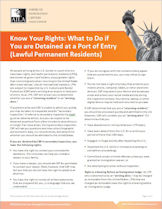Undocumented Immigrant or Out-of-Status Immigrant: Understanding Your Status
Immigration status in the United States is often complicated, with various terms used to describe people living in the country with different types of legal status, or none at all. As an immigration lawyer, I want to help you understand the specific terms that might describe your current status, since each one can affect what options are available for you. Today, we’ll go over the differences between being an undocumented immigrant and being an out-of-status immigrant. Though these terms might sound similar, they refer to different situations under U.S. immigration law. Knowing the distinction between the two can help you navigate your options and understand any potential pathways to legalization.
Undocumented Immigrant: What Does It Mean?
If someone is referred to as an undocumented immigrant, it means they’re living in the United States without legal authorization. There are two primary ways this can happen:
- Entering the U.S. without inspection: This occurs if a person crosses into the United States without going through a designated port of entry, meaning they weren’t formally inspected or approved to enter.
- Overstaying a Visa: Many people enter the U.S. legally with a visa, but if they remain after their visa expires, they’re considered undocumented.
As an undocumented immigrant, you’re living in the U.S. without formal authorization to stay or work, and unfortunately, you could be at risk of deportation if you come to the attention of immigration enforcement. The process to legalize your status from here can be challenging but not impossible, especially if certain eligibility criteria apply to you.
Out of Status: What Does It Mean?
Now, if you hear the term “out-of-status”, that generally refers to someone who entered the U.S. legally but lost their lawful status by not meeting certain conditions. For example:
- Losing Employment-Based Status: If you have a visa that’s connected to your job, you may fall out of status if you lose that job or if your visa requirements change.
- Failing to Meet Student Visa Requirements: If you’re on a student visa, you’re required to be enrolled full-time in school. If you drop out, fail to maintain the necessary credit hours, or change institutions without following the correct procedures, you could fall out of status.
As an out-of-status immigrant, you might have options to regain your lawful status or adjust to a more permanent form of residency, especially since you originally entered the country legally.
Key Differences to Understand
1. Pathways to Legalization
- Undocumented Immigrants: Your options to change your status can be more limited if you entered without legal authorization. However, pathways do exist, especially through family-based petitions, humanitarian programs, or even certain employment-based visas in special cases.
- Out-of-Status Immigrants: If you entered the U.S. legally, you generally have a wider range of options to adjust your status and regain lawful residency. This could include switching to a different type of visa or, in some cases, adjusting status within the U.S. without leaving the country.
2. Risk of Deportation
- Undocumented Immigrants: Without legal authorization to stay in the U.S., you may be at higher risk for deportation if you’re detected by immigration enforcement.
- Out-of-Status Immigrants: You may be somewhat safer if you’re actively seeking ways to regain lawful status. However, if no action is taken to adjust your status, you could still be deportable.
3. Work Authorization
- Undocumented Immigrants: You generally do not have the legal right to work in the U.S., although some limited programs, like DACA, do provide temporary work authorization.
- Out-of-Status Immigrants: Depending on your previous visa, you may still be eligible to regain work authorization if you can adjust your status.
Options for Each Category
If you’re an undocumented immigrant, you might qualify for certain relief options, like family-based petitions (if you have close family members who are U.S. citizens or permanent residents), marriage to a U.S. citizen, or, in some cases, asylum or humanitarian programs like Temporary Protected Status (TPS).
If you’re out of status, your options to adjust status often include different types of employment or family-based visas, or even adjusting within the U.S. based on your initial lawful entry. Many out-of-status immigrants find a solution by changing or reinstating their visa status or moving to a more permanent residency category.
What This Means for You
It is crucial to identify your specific status so we can explore your available options. Knowing if you’re undocumented versus out of status shapes the type of applications you might be eligible for, your options for work authorization, and the level of risk you face for deportation.
Questions About Your Immigration Status? Contact An Experienced Immigration Attorney
It is important to consult with a qualified immigration attorney. They can review your unique situation, discuss your long-term goals, and create a plan to move forward. Call immigration attorney Jessie M. Thomas at (214) 838-0045 or schedule a consultation.



